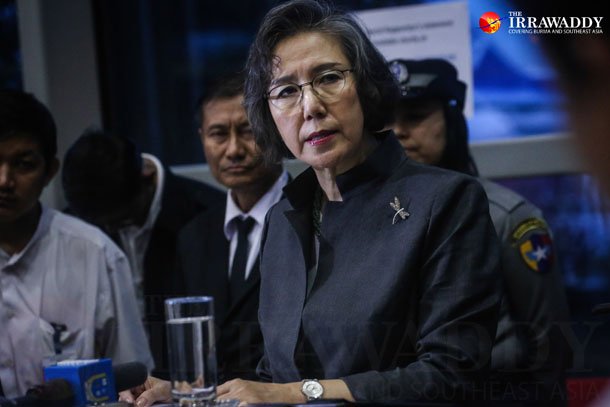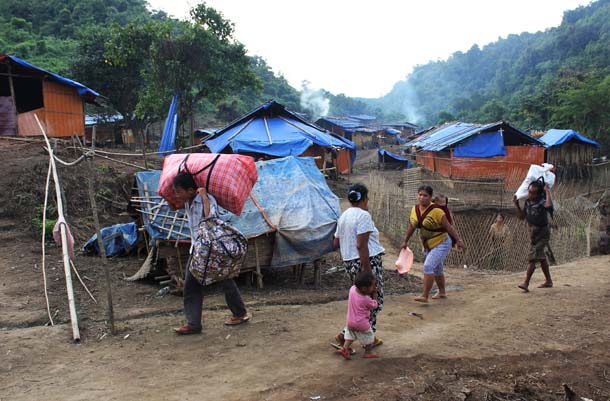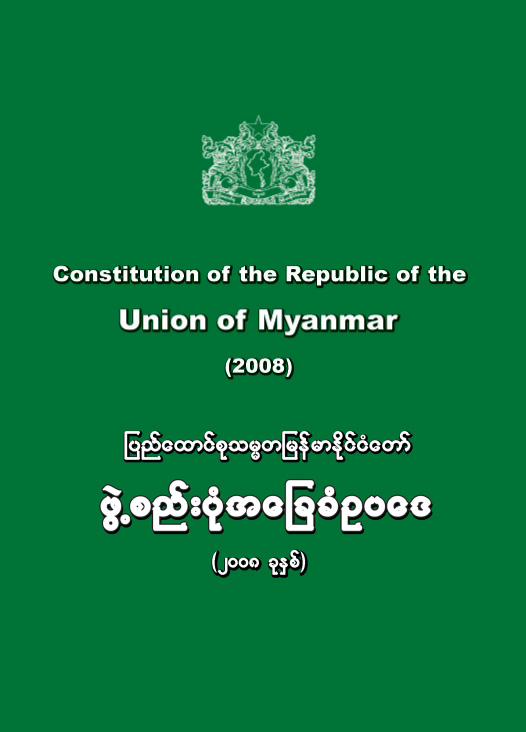124 search results found for "same impunity"
Rose-tinted Glasses Delivered to British Foreign Office- Burma Campaign UK
Burma Campaign UK was today joined by Baroness Kinnock, Baroness Nye, and supporters to deliver more than 2,000 rose-tinted glasses, photo petitions and campaign postcards to the British Foreign Office as part of our campaign to persuade the British government to stop looking at Burma through rose-tinted glasses, and return to putting human rights as their top priority in Burma […]
| |Myanmar: Investigate Alleged Rape and Killing of Two Kachin Women
The Myanmar authorities must ensure that a prompt, independent, impartial and effective investigation into the killing and alleged rape of two young Kachin women is carried out. Failure to investigate these allegations and hold those responsible to account would deny the victims and their families justice and contribute to an ongoing climate of impunity for rape and other crimes of sexual violence, in particular in conflict-affected and ethnic minority areas. […]
| |12 – 18 January: The Facts are Plain and Stated. It is Time to Act!
The full text of this week’s issue of Weekly Highlights, including an analysis of current events and news highlights from inside Burma, the region and internationally, as well opinion pieces, actions, statements, press releases and reports from Burma groups and relevant actors.
|The Facts are Plain and Stated. It is Time to Act!
 The US Special Envoy for Human Rights in Burma, US Assistant Secretary of State Tom Malinowski and his accompanying delegation, completed the second trip of this kind, highlighting the plethora of grave human rights concerns that continue to plague the people of Burma. On the same day, the UN Special Rapporteur on the situation of human rights in Burma, Yanghee Lee, also gave a stark analysis of progress in human rights.
The US Special Envoy for Human Rights in Burma, US Assistant Secretary of State Tom Malinowski and his accompanying delegation, completed the second trip of this kind, highlighting the plethora of grave human rights concerns that continue to plague the people of Burma. On the same day, the UN Special Rapporteur on the situation of human rights in Burma, Yanghee Lee, also gave a stark analysis of progress in human rights.
The two day, US-Myanmar Human Rights Dialogue visit included meetings with Union ministers in a closed door arrangement in Naypyidaw as well as meetings with civil society in Rangoon and Myitkyina, the capital of war-torn Kachin State. The 10-day trip of Special Rapporteur Yanghee Lee also included meetings with various government and civil society representatives, as well as visits to the site of the Letpadaung Copper Mine, Insein Prison, Arakan State, and Lashio, northern Shan State.
| |How Many More Lives? Burma Army Must Immediately Halt its Offensives in Kachin State
 Despite repeated calls from the international community, governments and civil society for an immediate halt to hostilities in Kachin and northern Shan State, on 19 November, 2014 the Burma Army fired several artillery missiles as “warning shots” onto the Kachin Independent Army’s (KIA) training academy in Laiza, Kachin State, killing 23 cadets and seriously injuring 20 others. Laiza is not only the KIA’s strong-hold. It is a city with over 20,000 civilians and a host to over 17,000 internally displaced persons (IDPs).
Despite repeated calls from the international community, governments and civil society for an immediate halt to hostilities in Kachin and northern Shan State, on 19 November, 2014 the Burma Army fired several artillery missiles as “warning shots” onto the Kachin Independent Army’s (KIA) training academy in Laiza, Kachin State, killing 23 cadets and seriously injuring 20 others. Laiza is not only the KIA’s strong-hold. It is a city with over 20,000 civilians and a host to over 17,000 internally displaced persons (IDPs).
Just days after the killing in Laiza, the Burma Army began firing shells near IDP camps. Some of the shells landed near a boarding school housing about 1,000 IDP children. These subsequent attacks near the camps threatened the lives of over 10,000 IDPs and raised much anxiety among the most vulnerable communities who have continuously fled the conflict. Fortunately, no one was hurt in these attacks, but many of the IDPs were forced to flee again in terror to the nearby jungle.
The narrative of “reform” and the sweeping political changes that have been praised and funded by the international community is quickly coming apart at the seams. While the Burma Government continues to use its rhetoric of change and democracy to encourage international governments, donors and investors to continue funding the peace process and development projects, they made one of the most deadly targeted attacks in Kachin State since the ceasefire broke down in 2011. This attack raised serious doubts among the ethnic groups who have threatened to abandon talks aimed at achieving a nationwide ceasefire accord. These talks, ongoing for nearly two years, have proved to be thus far redundant, as the Burma Army obviously has no other goal than the elimination of all ethnic armed groups without committing to any genuine, structural reforms. […]
| |24 – 30 November: How Many More Lives? Burma Army Must Immediately Halt its Offensives in Kachin State
The full text of this week’s issue of Weekly Highlights, including an analysis of current events and news highlights from inside Burma, the region and internationally, as well opinion pieces, actions, statements, press releases and reports from Burma groups and relevant actors.
|17 – 23 November: Constitutional Stalemate Sinks Hopes of Genuine Democracy and National Reconciliation
The full text of this week’s issue of Weekly Highlights, including an analysis of current events and news highlights from inside Burma, the region and internationally, as well opinion pieces, actions, statements, press releases and reports from Burma groups and relevant actors.
|Constitutional Stalemate Sinks Hopes of Genuine Democracy and National Reconciliation
 On Tuesday 18 November, Parliamentary Speaker of the lower house of the Burma Parliament Thura Shwe Mann boldly announced – to everyone’s great frustration but no one’s great surprise – that there would be no amendments made to the controversial 2008 Constitution before the 2015 national elections. So, what are the implications of this announcement, and why is the timing significant?
On Tuesday 18 November, Parliamentary Speaker of the lower house of the Burma Parliament Thura Shwe Mann boldly announced – to everyone’s great frustration but no one’s great surprise – that there would be no amendments made to the controversial 2008 Constitution before the 2015 national elections. So, what are the implications of this announcement, and why is the timing significant?
The implications for democracy in Burma are threefold. First, unless Article 59(f) is amended, Daw Aung San Suu Kyi will not be able to lead her NLD party and run for President in the 2015 elections. Although many have long feared the worst, thus far hope has persisted, especially in light of the NLD’s highly successful campaign in favor of constitutional amendment, which attracted five million signatories in support. However, Thura Shwe Mann now seems to be calling time on Daw Aung San Suu Kyi’s political career – and the dreams of so many long-suffering and long-hopeful Burmese – smoothly but ruthlessly side-lining her until such time as she can safely be labeled a political irrelevance, and dumped for good. At the same time, his comments can be interpreted as an oblique, discreet and wily announcement of his own ambitions for a tilt at the presidency next year.
Second, without a significant overhaul of the 2008 Constitution to ensure that the rights, autonomy and self-determination of ethnic minority nationalities are respected and enshrined in law, the peace process does not stand a chance. Fighting rages on in Kachin State – not to mention in northern Shan and Karen State – with no sign of abating. The day after Thura Shwe Mann made his announcement, 23 Kachin and other ethnic nationality soldiers were killed and as many as 15 wounded when Burma Army troops fired on a military training base in Laiza, the strategic headquarters of the Kachin Independence Army. […]
| |Myanmar: Ensure Independent and Impartial Investigation into Death of Journalist
The Myanmar authorities must ensure a comprehensive, independent, impartial and effective investigation into the death of journalist Aung Kyaw Naing, aka Par Gyi, who was reportedly killed while in the custody of the Myanmar Army in Mon State, Eastern Myanmar, earlier this month. Failure to adequately ? and transparently ? investigate such serious allegations and hold perpetrators to account would further entrench impunity in the country, and have a chilling effect on other journalists […]
| |Myanmar: UNGA Resolution Must Address Backtracking on Human Rights
As the new UN Special Rapporteur on the situation of human rights in Myanmar, Yanghee Lee, today presents her first report to the 69thsession of the UN General Assembly (UNGA), Amnesty International calls on the UNGA to adopt a resolution on the country which addresses the government’s backtracking on human rights […]
| |








 All posts
All posts